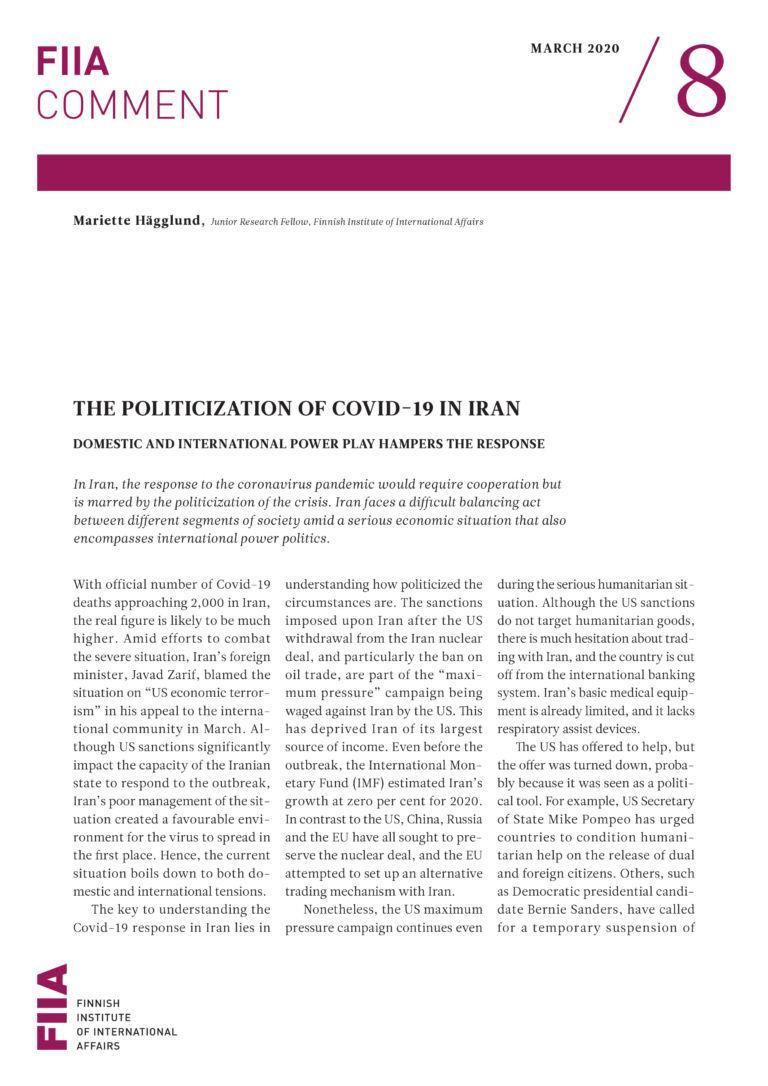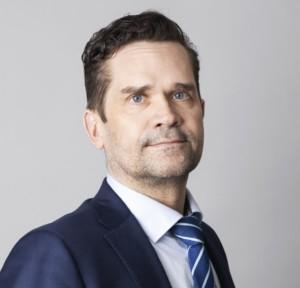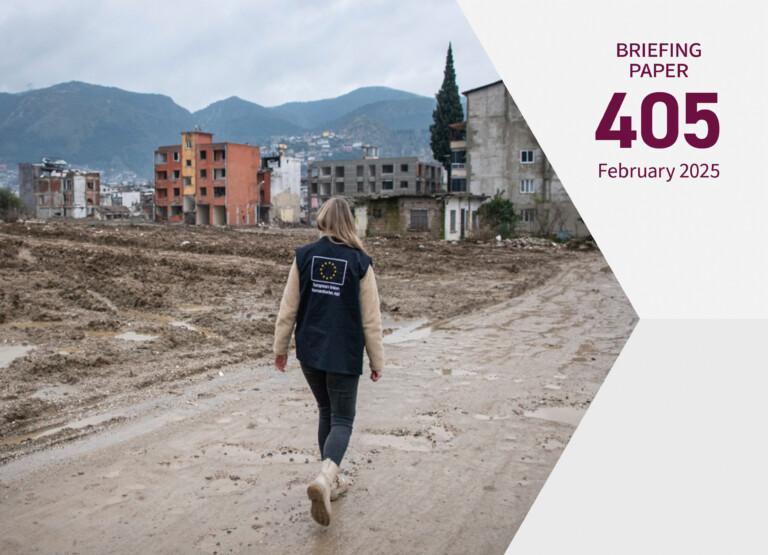
In Iran, the response to the coronavirus pandemic would require cooperation but is marred by the politicization of the crisis. Iran faces a difficult balancing act between different segments of society amid a serious economic situation that also encompasses international power politics.
With official number of Covid-19 deaths approaching 2,000 in Iran, the real figure is likely to be much higher. Amid efforts to combat the severe situation, Iran’s foreign minister, Javad Zarif, blamed the situation on “US economic terrorism” in his appeal to the international community in March. Although US sanctions significantly impact the capacity of the Iranian state to respond to the outbreak, Iran’s poor management of the situation created a favourable environment for the virus to spread in the first place. Hence, the current situation boils down to both domestic and international tensions.
The key to understanding the Covid-19 response in Iran lies in understanding how politicized the circumstances are. The sanctions imposed upon Iran after the US withdrawal from the Iran nuclear deal, and particularly the ban on oil trade, are part of the “maximum pressure” campaign being waged against Iran by the US. This has deprived Iran of its largest source of income. Even before the outbreak, the International Monetary Fund (IMF) estimated Iran’s growth at zero per cent for 2020. In contrast to the US, China, Russia and the EU have all sought to preserve the nuclear deal, and the EU attempted to set up an alternative trading mechanism with Iran.
Nonetheless, the US maximum pressure campaign continues even during the serious humanitarian situation. Although the US sanctions do not target humanitarian goods, there is much hesitation about trading with Iran, and the country is cut off from the international banking system. Iran’s basic medical equipment is already limited, and it lacks respiratory assist devices.
The US has offered to help, but the offer was turned down, probably because it was seen as a political tool. For example, US Secretary of State Mike Pompeo has urged countries to condition humanitarian help on the release of dual and foreign citizens. Others, such as Democratic presidential candidate Bernie Sanders, have called for a temporary suspension of sanctions, while the World Health Organization has dispatched several tonnes of medical supplies to Iran. The government has now requested 5-billion-dollar funding from the IMF. This would be the first financial arrangement between the two since 1960. As the largest shareholder, the US has, however, the power to potentially veto the assistance.
This draws attention to the ongoing debate within Iran about its positioning internationally – with hardliners firmly opposed to cooperation with the West and moderates preferring a more open Iran. While the US withdrawal from the nuclear deal and the sanctions regime have pulled the carpet from under the moderates’ feet, Covid-19 has shown that an isolationist policy is increasingly difficult for Iran. In an attempt to prevent the virus from spreading, its neighbours have already closed their borders, affecting Iran’s international trade and regional political influence.
The division between religious authorities and technocrats in the country is a constant challenge in a political sphere where hardliners currently hold more power. The coronavirus situation is a continuation of this internal power play. Due to opposing viewpoints, there was a major lag when it came to closing down holy shrines and mosques in Mashhad and Qom, which is both a centre for religious authorities and the centre of the outbreak. A month elapsed after the first two deaths in Qom before holy sites were closed down.
Many issues can be traced back to a lack of transparency, which has translated into increased scepticism among ordinary Iranians towards official narratives. Iran now has difficulties with projecting authority and many people are ignoring any warnings from the government. Even the initial announcement about the outbreak on February 19 was timed to prioritize political gains over public health concerns, occurring after the anniversary of the Islamic Revolution on February 11 but before the parliamentary elections on February 21. The anniversary typically draws numerous people to Tehran and the larger the crowd, the better. More importantly, due to dissatisfaction with the economic and political situation, a low turnout was expected ahead of the elections. Now it seems that the outbreak likely served as an excuse for the all-time low turnout of 42%. Iran lost a great deal of time and legitimacy by downplaying the situation and not disclosing information.
Unlike the problems Iran faced in the past six months (such as protests in the autumn and the excessive violence used to repress them; the increasing tensions between Iran and the US playing out in Iraq; and the shooting down of Ukraine International Airlines Flight 752), Covid-19 has thrust the consequences of the country’s political mistakes upon the decision-makers. By early March, 10% of Iranian members of parliament had already been infected, and senior clerics, some close to Ayatollah Khamenei, had died due to the virus.
It is still too early to say whether or not Covid-19 will actually have any impact on the political culture framing Iran’s domestic and foreign policy, but the pressure for change is more intense than before. The difficult economic situation provides Iran with much less leeway for political mistakes, and the ones made so far have had a serious impact on its citizens – as well as on the elite this time. What is clear is that Iran will need the support of the international community to be able to cope with the crisis, but the question remains as to the extent to which the tensions between Iran and the US will hamper efforts.









